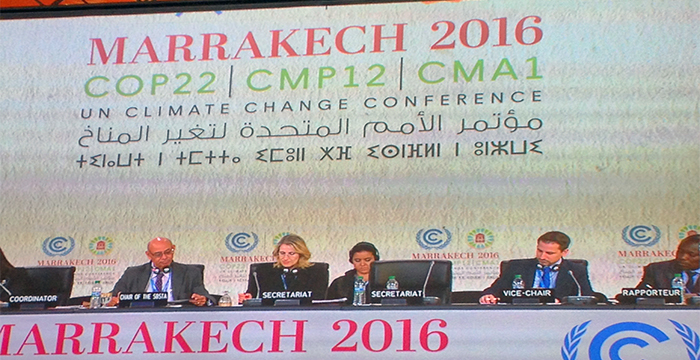Hailed as the “COP of Action” since before its opening, COP22 no longer holds such promise for agriculture. The scene, seemed set for action: the Paris Agreement opened the doors for real progress on agriculture and there were clear commonalities in both country goals and practices. During the negotiations, while there were differences, countries were able to agree on some significant issues and worked hard to reach a decision. However, differences won out and countries were not able to focus on these areas of consensus to reach a substantive decision when the agenda item closed on Friday, postponing discussions until the next negotiations in May 2017. So, how did this happen, and where do we go from here?
The promise for action
As parties began to discuss agriculture, they unearthed many areas of common ground. There was a strong sense of urgency and desire for action shared by many countries. Countries agreed on the need to explore policy options to spur action. Countries also acknowledged the need to address climate change through good agricultural practices and to share knowledge and lessons learned. As we wrote in our last blog and analysis, countries are already implementing many common practices, which they shared in their submissions to SBSTA 44. These practices include efficiently managing resources like water, nutrients, and soil, which can have multiple benefits for adaptation, mitigation and productivity.
Full negotiating texts were put forward, giving parties a starting ground. This was further than negotiators had gotten since discussions on agriculture started in Durban in 2011. They finally had the ability to address possible points of contention, then to adjust, and finally compromise. The delegates were obviously hard at work in the days leading up to their submission deadline. They met late into the night negotiating a text that could be somewhat acceptable to all parties. After three long days, however, negotiators could not get past fundamental differences. This led to a half-worked upon text that countries decided they could not use as a starting point for negotiations at the next SBSTA in May, losing much of the progress they made this week.
What went wrong?
Even as progress was made in certain areas – with valuable contributions from many parties – other components were locked in complete standstill. There were fundamental disagreements that stalled the negotiations, such as:
- Whether to only focus on adaptation and food security—which is of utmost importance to all, but especially vulnerable, developing countries—or to also address mitigation in agriculture
- and whether there should be a call for developed countries to provide finance and other support for developing countries.
While the COP presidency strongly encouraged the Parties to reach an agreement and put pressure by offering clear deadlines, parties were unable to negotiate efficiently. It is clear that both significantly more time and efficiency will be required to achieve real progress on agriculture.
The silver lining
The issue of agriculture is complex and the fact that parties are offering texts as starting points for negotiations shows that future progress on agriculture may be closer than it looks:
- There is even stronger urgency and desire for action. Negative impacts of climate change are being felt now for agriculture. Agricultural emissions are significantly contributing to the warming of our planet. Inaction will no longer be an option. This urgency will be made clear on Wednesday, November 16 at the Agriculture and Food Security Action Day during the second week of COP22.
- Though it was difficult to reach agreement at this COP, countries are starting to acknowledge that many best agricultural practices have benefits for both adaptation and mitigation.
- Countries are already implementing many good agricultural practices, which they have shared with each other at the UNFCCC and in other international fora. These practices can provide areas of common ground for the next negotiations.
- Progress, even incremental and painstaking, is still progress. Text was proposed and discussed; valuable contributions and ideas were shared. Parties can take elements of this text, especially points of consensus, to the subsidiary meeting in May.
Of course, this is all dependent on the commitment and willingness to engage on agriculture – from all stakeholders. Countries must be willing to focus on common goals between all countries, and also to compromise where needed. EDF and our partners stand ready to provide support and share our experiences in agriculture in countries around the world to reach a decision on agriculture.
Enviroshop is maintained by dedicated NetSys Interactive Inc. owners & employees who generously contribute their time to maintenance & editing, web design, custom programming, & website hosting for Enviroshop.

